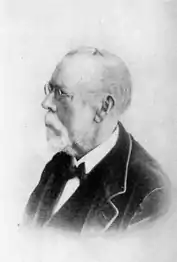Professor Hoffmann
Professor Hoffmann (1839–1919) was the pseudonym of Angelo John Lewis, an English-born barrister and writer who has been described as "the most prolific and influential magic author and translator until modern times."[1]

Life
Professor Hoffmann was born as Angelo John Lewis in London, England on 23 July 1839. He studied law at Oxford University and became a barrister in London.[2]
During the early 1860s he learned magic from a book and became an amateur magician. Under the pen name Professor Hoffmann, in 1873 he published a series of articles in Routledge's Every Boy's Annual which "launched his career as the most prolific and influential magic author and translator until modern times."[1]
In 1876, Professor Hoffman published Modern Magic to educate the public in how to become a magician, including how to perform sleight of hand tricks, as well as how to dress and speak.[2] Hoffmann's book was successful, allowing him to become a full-time writer. He subsequently published a variety of books and articles, including the children's novel Conjurer Dick and several compendiums of illusions.[2] He also wrote on card games including patience.
Works
The following is a selection of Hoffmann's works:[3]
- Modern Magic (1876)
- The Cyclopaedia of Card and Table Games. (1891).
- The Illustrated Book of Patience Games. (1892).
- Latest Magic, Being Original Conjuring Tricks [2020 reprint]
- Bridge (1924)
- Selected Patience Games (188?)
- Card Tricks with Apparatus (1892)
References
- Professor Hoffmann at lybrary.com. Retrieved 31 December 2021.
- Copperfield, David; Wiseman, Richard; Britland, David (2021). David Copperfield's history of magic. New York, NY. ISBN 978-1-9821-1291-2. OCLC 1236259508.
{{cite book}}: CS1 maint: location missing publisher (link) - Angelo Lewis (Professor Hoffmann) at worldcat.org. Retrieved 31 Dec 2021.